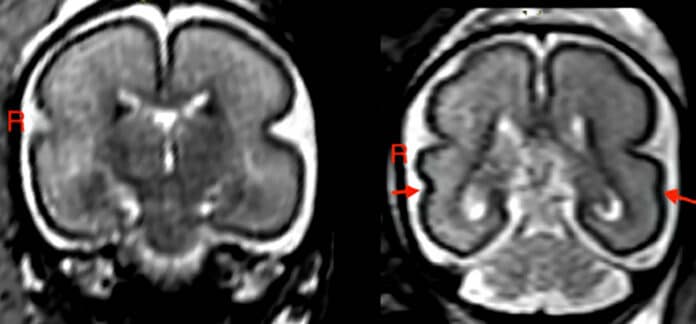Fetal alcohol spectrum disorders are a range of diseases that can affect the fetus if alcohol is consumed while pregnant. Babies born with fetal alcohol spectrum disorders may experience developmental delays in speech and language, learning disabilities, or behavior problems.
Unfortunately, many pregnant women are unaware of the influence of alcohol on the fetus during pregnancy. A new study aims to highlight the effects of alcohol on the fetus.
A new MRI study revealed that consumption of alcohol, even in low to moderate amounts during pregnancy, can change the baby’s brain structure and delay brain development.
Study senior author Gregor Kasprian, M.D., associate professor of radiology from the Department of Biomedical Imaging and Image-guided Therapy of the Medical University of Vienna in Austria, said, “Fetal MRI is a highly specialized and safe examination method that allows us to make accurate statements about brain maturation prenatally.”
Scientists analyzed MRI exams of 24 fetuses with prenatal alcohol exposure. At the time of the MRI, the fetuses ranged in gestational age from 22 to 36 weeks. Anonymous surveys given to the mothers helped identify the mothers’ alcohol exposure. The questionnaires employed were the T-ACE Screening Tool, a measurement tool of four questions that identify risk drinking, and the Pregnancy Risk Assessment Monitoring System (PRAMS), a surveillance initiative of the Centers for Disease Control and Prevention and health departments.
The fetal total maturation score (fTMS) and right superior temporal sulcus (STS) were considerably lower in foetuses exposed to alcohol than in age-matched controls. The STS plays a role in language perception, audiovisual integration, and social cognition.
Dr. Kasprian said, “We found the greatest changes in the temporal brain region and STS. We know that this region, and specifically the formation of the STS, has a great influence on language development during childhood.”
Lead author Patric Kienast, M.D., a Ph.D. student in the Department of Biomedical Imaging and Image-Guided Therapy, Division of Neuroradiology and Musculoskeletal Radiology at the Medical University of Vienna, said, “Seventeen of 24 mothers drank alcohol relatively infrequently, with average alcohol consumption of less than one alcoholic drink per week. Nevertheless, we could detect significant changes in these fetuses based on prenatal MRI.”
Two mothers drank four to six drinks a week, while three mothers consumed one to three. One mother had at least 14 drinks each week on average. Additionally, six moms reported having at least one binge drinking incident (more than four drinks on one occasion) when pregnant.
The research shows that a delayed stage of myelination and a less defined gyrification in the frontal and occipital lobes were responsible for the delayed fetal brain development.
Dr. Kienast said, “Pregnant women should strictly avoid alcohol consumption. As we show in our study, even low levels of alcohol consumption can lead to structural changes in brain development and delayed brain maturation.”
Although, it remains elusive how these structural changes will affect brain development in these babies after birth.
Dr. Kienast said, “To assess this accurately, we need to wait for the children who were examined as fetuses to get a little older, so we can invite them back for further examinations. However, we can strongly assume that the changes we discovered contribute to the cognitive and behavioral difficulties that may occur during childhood.”
The results of the study will be presented next week at the annual meeting of the Radiological Society of North America (RSNA).
